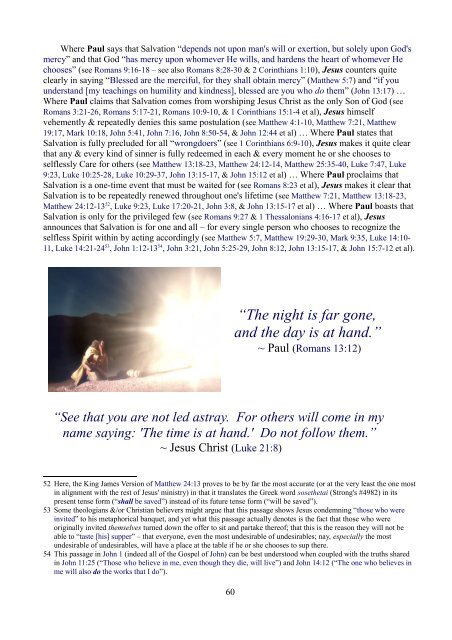The Cult of Paul
an exhaustive biblical examination of the starkly contrasting lives, values, & theologies of Jesus Christ and Paul -- Jesus' most zealous “apostle,” and the true father of the modern-day Christian church
an exhaustive biblical examination of the starkly contrasting lives, values, & theologies of Jesus Christ and Paul -- Jesus' most zealous “apostle,” and the true father of the modern-day Christian church
Create successful ePaper yourself
Turn your PDF publications into a flip-book with our unique Google optimized e-Paper software.
Where <strong>Paul</strong> says that Salvation “depends not upon man's will or exertion, but solely upon God's<br />
mercy” and that God “has mercy upon whomever He wills, and hardens the heart <strong>of</strong> whomever He<br />
chooses” (see Romans 9:16-18 – see also Romans 8:28-30 & 2 Corinthians 1:10), Jesus counters quite<br />
clearly in saying “Blessed are the merciful, for they shall obtain mercy” (Matthew 5:7) and “if you<br />
understand [my teachings on humility and kindness], blessed are you who do them” (John 13:17) …<br />
Where <strong>Paul</strong> claims that Salvation comes from worshiping Jesus Christ as the only Son <strong>of</strong> God (see<br />
Romans 3:21-26, Romans 5:17-21, Romans 10:9-10, & 1 Corinthians 15:1-4 et al), Jesus himself<br />
vehemently & repeatedly denies this same postulation (see Matthew 4:1-10, Matthew 7:21, Matthew<br />
19:17, Mark 10:18, John 5:41, John 7:16, John 8:50-54, & John 12:44 et al) … Where <strong>Paul</strong> states that<br />
Salvation is fully precluded for all “wrongdoers” (see 1 Corinthians 6:9-10), Jesus makes it quite clear<br />
that any & every kind <strong>of</strong> sinner is fully redeemed in each & every moment he or she chooses to<br />
selflessly Care for others (see Matthew 13:18-23, Matthew 24:12-14, Matthew 25:35-40, Luke 7:47, Luke<br />
9:23, Luke 10:25-28, Luke 10:29-37, John 13:15-17, & John 15:12 et al) … Where <strong>Paul</strong> proclaims that<br />
Salvation is a one-time event that must be waited for (see Romans 8:23 et al), Jesus makes it clear that<br />
Salvation is to be repeatedly renewed throughout one's lifetime (see Matthew 7:21, Matthew 13:18-23,<br />
Matthew 24:12-13 52 , Luke 9:23, Luke 17:20-21, John 3:8, & John 13:15-17 et al) … Where <strong>Paul</strong> boasts that<br />
Salvation is only for the privileged few (see Romans 9:27 & 1 <strong>The</strong>ssalonians 4:16-17 et al), Jesus<br />
announces that Salvation is for one and all – for every single person who chooses to recognize the<br />
selfless Spirit within by acting accordingly (see Matthew 5:7, Matthew 19:29-30, Mark 9:35, Luke 14:10-<br />
11, Luke 14:21-24 53 , John 1:12-13 54 , John 3:21, John 5:25-29, John 8:12, John 13:15-17, & John 15:7-12 et al).<br />
“<strong>The</strong> night is far gone,<br />
and the day is at hand.”<br />
~ <strong>Paul</strong> (Romans 13:12)<br />
“See that you are not led astray. For others will come in my<br />
name saying: '<strong>The</strong> time is at hand.' Do not follow them.”<br />
~ Jesus Christ (Luke 21:8)<br />
52 Here, the King James Version <strong>of</strong> Matthew 24:13 proves to be by far the most accurate (or at the very least the one most<br />
in alignment with the rest <strong>of</strong> Jesus' ministry) in that it translates the Greek word sosethetai (Strong's #4982) in its<br />
present tense form (“shall be saved”) instead <strong>of</strong> its future tense form (“will be saved”).<br />
53 Some theologians &/or Christian believers might argue that this passage shows Jesus condemning “those who were<br />
invited” to his metaphorical banquet, and yet what this passage actually denotes is the fact that those who were<br />
originally invited themselves turned down the <strong>of</strong>fer to sit and partake there<strong>of</strong>; that this is the reason they will not be<br />
able to “taste [his] supper” – that everyone, even the most undesirable <strong>of</strong> undesirables; nay, especially the most<br />
undesirable <strong>of</strong> undesirables, will have a place at the table if he or she chooses to sup there.<br />
54 This passage in John 1 (indeed all <strong>of</strong> the Gospel <strong>of</strong> John) can be best understood when coupled with the truths shared<br />
in John 11:25 (“Those who believe in me, even though they die, will live”) and John 14:12 (“<strong>The</strong> one who believes in<br />
me will also do the works that I do”).<br />
60

















